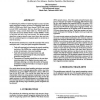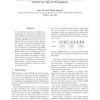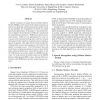153 search results - page 14 / 31 » Bayesian sensing hidden Markov models for speech recognition |
NAACL
1994
15 years 12 days ago
1994
In addressing the problem of achieving high-accuracy real-time speech recognition systems, we focus on recognizing speech from ARPA's20,000-word Wall Street Journal (WSJ) tas...
104
click to vote
TSMC
2008
14 years 11 months ago
2008
Recent studies have shown that the perception of natural movements--in the sense of being "humanlike"--depends on both joint and task space characteristics of the movemen...
86
Voted
TASLP
2008
14 years 11 months ago
2008
The new model reduces the impact of local spectral and temporal variability by estimating a finite set of spectral and temporal warping factors which are applied to speech at the f...
NAACL
2003
15 years 14 days ago
2003
It is well known that frame independence assumption is a fundamental limitation of current HMM based speech recognition systems. By treating each speech frame independently, HMMs ...
92
Voted
ICPR
2006
IEEE
16 years 6 days ago
2006
IEEE
Speech recognition is usually based on Hidden Markov Models (HMMs), which represent the temporal dynamics of speech very efficiently, and Gaussian mixture models, which do non-opt...



